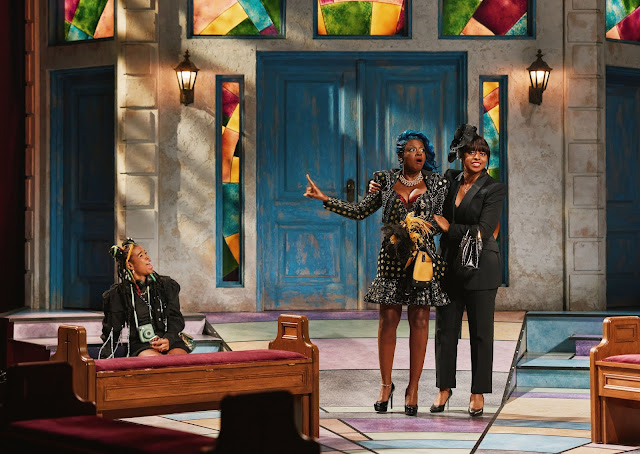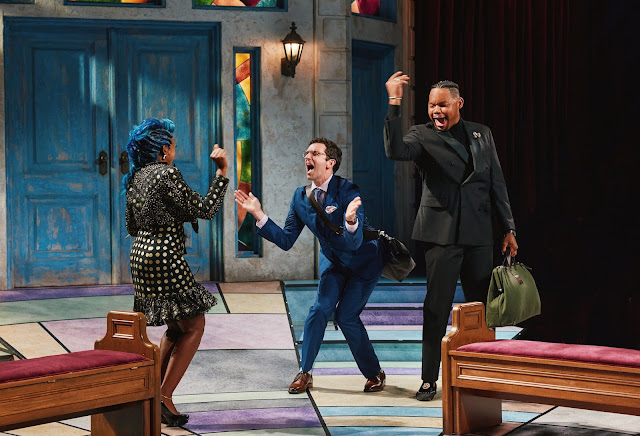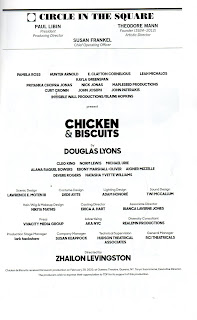 |
| Norm Lewis, Cleo King. (Photos: Emilio Madrid.) |
 |
| Michael Urie, Devere Rogers. |
 |
| Aigner Mizzelle, Ebony Marshall-Oliver, Alana Raquel Bowers. |
Friendly, warmhearted, and schmaltzy, the play—vigorously staged
by Zhailon Levingston—never makes up its mind as to just what it wants to be.
It spends the first half of its intermissionless 110 minutes establishing its clichéd
characters with broadly painted strokes before anything one might call an “inciting
incident” occurs. At that point, it suddenly introduces a new character whose
catalytic presence blows the situation sky high before the pieces manage to
fall back to earth in neatly packaged, feel-good resolutions.
Cleo King (like many in the cast, making an impressive
Broadway debut) and the always reliable Norm Lewis (Broadway’s first African-American
Phantom in Phantom of the Opera) play
the middle-aged matriarch Baneatta Mabry and her preacher husband Reginald. When
we first see this lovingly bantering couple they’re preparing to attend the
funeral of Baneatta’s preacher father, Bernard Jenkins. Reggie has succeeded to
his father-in-law’s position at St. Luke’s church in New Haven, CT, where the
funeral is about to take place.
Accordingly, Lawrence E. Moten III’s set—brightly lit by
Adam Honoré—turns the Circle’s three-quarters round configuration into a church
interior, including stained-glass images on the surrounding walls, with movable
pews that help divide the space into multiple locales. The churchy atmosphere
is enhanced by Dede Ayite’s lively costumes, including the ladies’ memorable
millinery.
As per the formula for funeral plays, film, and TV shows
(like, for example, 2007’s Death at a
Funeral, also about a Black family), those most closely associated with the
deceased gather closely together to say their farewells. Volatile family
chemicals in such proximity can be explosive, of course; as expected, the expected
detonation eventually occurs.
Among the array of heightened characters is Baneatta’s
sass-spouting, bra-busting sister, Beverly (Ebony Marshall Oliver, a force of
nature). A fitter-than-a-fiddle peacock in black spikes, sequined dress, and
jacket, she colors her multi-patterned hair a dazzling turquoise (and other eye-catching
hues). We soon see the tension between the self-consciously outrageous Beverly—who
pushes the envelope the way her bra pushes up her puppies (as she calls them)—and
her upright church lady sister, indignant about Beverly flaunting her “titties”
so openly. This becomes one of several running jokes.
The sibling conflict between Beverly and Baneatta is
balanced by the discomfort felt by Baneatta’s gay actor son, Kenny (Devere
Rogers), about coming out to his family. (Haven’t we seen this play before?)
This, despite Kenny’s being there with his lover, Logan Leibowitz (Michael
Urie, increasingly typecast as a needy gay guy), white and Jewish. In a
particularly tired running joke, no one can properly remember the name Logan: Lamar,
Loofah, and Lucas are among those proffered. Only the audience,
perhaps, has any trouble with Baneatta or La’ Trice.
 |
| Ebony Marshall-Oliver, Michael Urie, Devere Rogers, Cleo King. |
La' Trice (the ultra-animated Aigner Mizzelle) is Beverly’s fifteen-year-old daughter, an aspiring songstress-song writer, as extreme in her own overstated teen fashionista way and manners as her flamboyant mom. Then there’s the Mabrys’ somewhat more subdued daughter, Simone (the grounded Alana Raquel Bowers), Kenny’s sister, nursing her own private wounds, who objects to Kenny’s dalliance with a white man. Finally, we meet Brianna (NaTasha Yvette Williams, solid), the surprise visitor who finally gets the plot moving. I’ll avoid disclosing her connection, although it’s just another part of the formula.
Chicken and Biscuits takes
pleasure in its own cartoonishness, sometimes even breaking the fourth wall to
take the audience into its world (we’re presumed, when necessary, to be part of
the funeral attendees). This wouldn’t be so bad if the material were funnier,
or if the acting—polished as the performers are—weren’t trying so hard to make
us laugh. For farce to work, you need more than energy and sheer determination.
You have to be credible, and that, despite the obvious talent present, doesn’t
happen enough in Chicken and Biscuits.
 |
| Ebony Marshall-Oliver, Michael Urie, Devere Rogers. |
The play does sometimes veer, oddly, into the realm of
believability. For instance, most of the characters are asked to deliver a
three-minute eulogy of the departed. For perhaps fifteen minutes you hear just
the kind of sincere memories, with occasional comic flavoring, as you’d be
likely to encounter at any real-life service. The dramatic action freezes and
we listen as if there really was a corpse in the onstage coffin. But when the
otherwise sober preacher speak-sings his piece (Norm Lewis has a Broadway
voice, of course), the play shifts into another, much wilder realm, out of sync
with what’s just transpired. And when Brianna explains who she is, things get
even crazier.
 |
| Alana Raquel Bowers, Aigner Mizzelle. |
Sibling rivalries, escapes from the gay closet, parental
worries, religious aspirations, Black women’s empowerment, and inter-racial
humor (don’t forget that very white guy’s presence) are appropriate concerns, even
if meant more for laughs than social change; they all get their moments—both satirical
and serious—in the spotlight. But they're not enough to make this a satisfying theatrical meal.
 |
| Cleo King, Ebony Marshall-Oliver, NaTasha Yvette Williams. |
You can mash, fry, boil, and bake Chicken and Biscuits but it still doesn’t make a very good play.
 |
| Cleo King and the cast of Chicken and Biscuits. |
Circle in the Square
1633 Broadway, NYC (Fiftieth Street)
Through January 2, 2022


